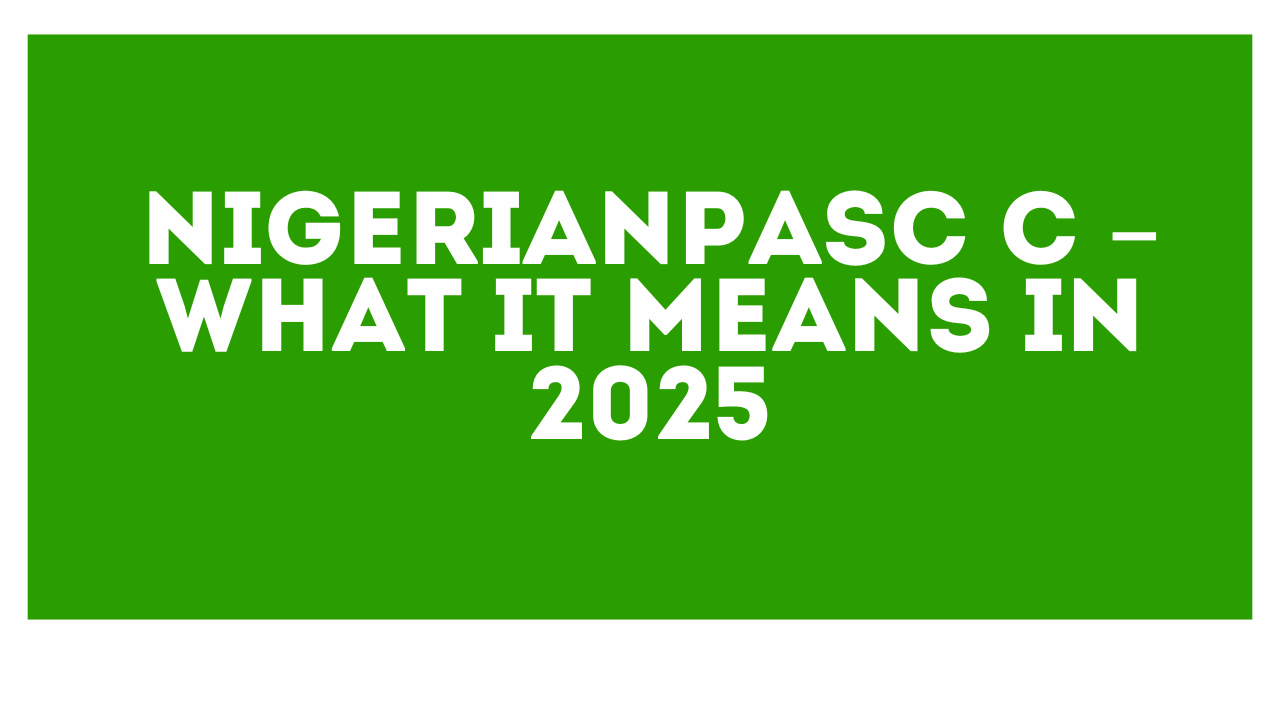Overview of Nigerian PASC C
Definition of Nigerian PASC C
Nigerian PASC C stands for the Nigerian Private Sector Agenda on Climate.
This initiative aims to drive climate-smart practices across various sectors.
Furthermore, it focuses on promoting sustainable development in Nigeria.
Purpose of Nigerian PASC C
The primary purpose is to enhance climate resilience within communities.
Additionally, it seeks to reduce greenhouse gas emissions effectively.
Nigerian PASC C also aims to foster collaboration among stakeholders.
It encourages private sector involvement in addressing climate issues.
This participation is critical for driving innovative climate solutions.
Impact on the Economy
Nigerian PASC C has the potential to significantly boost the economy.
It promotes investments in sustainable technologies and practices.
Moreover, it creates job opportunities in green sectors.
This initiative encourages the development of eco-friendly businesses.
Community Engagement
Community involvement is a cornerstone of Nigerian PASC C.
Education and awareness programs play a vital role in its success.
Communities are empowered to adopt climate-resilient practices.
Furthermore, their participation ensures local needs are addressed.
Future Directions
Looking ahead, Nigerian PASC C aims to expand its reach and impact.
It will continue to adapt to emerging climate challenges.
Additionally, it will strengthen partnerships with international organizations.
This approach will foster knowledge sharing and best practices.
The Evolution of Nigerian PASC C
Historical Context
The Nigerian PASC C, established in the early 2000s, emerged from a need for regulatory oversight.
Initially, it focused on market stability and consumer protection.
Over the years, its role expanded significantly.
In response to changing economic conditions, PASC C adapted its strategies.
Legislative changes also played a vital role in its evolution.
Key Milestones
A major milestone occurred in 2010 when PASC C revised its regulatory framework.
This revision aimed to improve efficiency and enhance market access.
Another significant development was the partnership with international agencies in 2015.
This partnership brought technical expertise and funding.
Moreover, the introduction of digital platforms in 2020 transformed its operations.
Impact on Stakeholders
PASC C’s evolution positively impacted farmers and consumers alike.
Farmers gained better access to markets, resulting in increased incomes.
Consumers benefited from improved product safety standards.
Additionally, the agency boosted transparency across the agricultural sector.
This created a more robust and secure environment for trade.
Key Stakeholders in Nigerian PASC C and Their Roles
Government Agencies
Government agencies play a crucial role in Nigerian PASC C.
They develop policies that guide the implementation of the strategy.
Additionally, they regulate the activities of stakeholders.
The Ministry of Agriculture oversees the agricultural sector.
They ensure compliance with national standards and regulations.
Private Sector Participation
The private sector is essential for the success of Nigerian PASC C.
Private companies invest in agricultural innovations and technologies.
Furthermore, they provide necessary resources and expertise.
Agro-processing firms add value to raw agricultural products.
Their involvement helps boost the economy and create jobs.
Non-Governmental Organizations
Non-governmental organizations support various initiatives under PASC C.
They advocate for sustainable practices and community engagement.
NGOs often provide training and resources to local farmers.
They also promote awareness about environmental challenges.
With their help, farmers adopt better practices for productivity.
Farmers and Local Communities
Farmers are at the heart of Nigerian PASC C implementation.
They directly apply the strategies on the ground.
Local communities contribute traditional knowledge and practices.
Collective action among farmers enhances bargaining power.
Moreover, community involvement strengthens local agricultural systems.
Academic and Research Institutions
Academic institutions provide vital research support to PASC C.
They conduct studies that inform policy development.
Researchers analyze agricultural trends and practices.
Collaboration with farmers leads to innovative solutions.
They ensure that scientific advancements reach the agricultural sector.
Technological Advancements Impacting Nigerian PASC C by 2025
Emerging Technologies in Agriculture
Robotic technology is set to revolutionize farming practices in Nigeria.
These advancements increase efficiency in planting and harvesting crops.
Drones will facilitate precise crop monitoring and assessment.
Furthermore, AI tools will enhance decision-making based on data analysis.
Digital Transformation and Connectivity
The expansion of internet access enables farmers to utilize online resources.
These digital platforms will provide access to market prices and weather forecasts.
Mobile applications will connect farmers with buyers directly, reducing intermediaries.
Consequently, farmers can maximize their profits through better sales strategies.
Smart Irrigation and Water Management
Smart irrigation systems will optimize water usage across farms.
These solutions are crucial given Nigeria’s diverse climatic regions.
IoT devices will monitor soil moisture levels, ensuring efficient water application.
With better water management, productivity can significantly increase.
Genetic Engineering and Crop Improvement
Biotechnology will play a major role in improving crop yields.
Genetically modified organisms (GMOs) will resist pests and diseases effectively.
As a result, farmers will experience reduced crop losses annually.
Additionally, new crop varieties will adapt better to changing weather patterns.
Training and Skill Development
Continuous training programs will educate farmers about new technologies.
Workshops and online courses will enhance practical skills and knowledge.
Moreover, partnerships with universities will foster innovation in agricultural practices.
This commitment to education will prepare farmers for future challenges.
Challenges Faced by Nigerian PASC C
Understanding the Current Landscape
Nigerian PASC C encounters significant challenges in various sectors.
Firstly, inadequate funding limits its operational effectiveness.
Many initiatives remain underfunded, hindering development.
Moreover, bureaucratic inefficiencies complicate implementation processes.
Stakeholders often face delays due to red tape.
Furthermore, infrastructural deficits plague the organization’s projects.
PASC C struggles with outdated facilities and technology.
These shortcomings impede overall performance and outreach.
Addressing Human Resource Limitations
A shortage of trained professionals is another pressing issue.
Many are unqualified for specialized roles within the organization.
This gap leads to inefficient execution of critical tasks.
Additionally, high turnover rates exacerbate human resource challenges.
Employees often seek better opportunities elsewhere.
As a result, continuity and knowledge transfer suffer significantly.
Engaging Stakeholders Effectively
Effective stakeholder engagement remains a challenge.
Many stakeholders lack clear communication channels with PASC C.
This leads to misunderstandings and decreased collaboration.
Moreover, local communities often feel neglected in decision-making.
PASC C needs to address this disconnect to improve relations.
Proposed Solutions for Improvement
Enhancing Funding Opportunities
Improving funding avenues is paramount for future growth.
PASC C should explore partnerships with private entities.
Additionally, applying for international grants could be beneficial.
These strategies may diversify funding sources and increase resources.
Investing in Human Resources
Investing in workforce training is essential for overcoming skill gaps.
Organizing regular workshops and training sessions can help.
Moreover, establishing mentorship programs may retain talent.
Developing clear career paths can motivate employees to stay.
Strengthening Stakeholder Engagement
Improving communication with stakeholders is vital.
PASC C should create platforms for regular feedback and dialogue.
These platforms can enhance transparency and build trust.
Furthermore, involving local communities in decision-making is crucial.
Active participation fosters a sense of ownership and commitment.
The Future of Nigerian PASC C: Predictions and Trends for 2025
Overview of the Current Landscape
Nigerian PASC C plays a crucial role in the country’s digital economy.
In 2025, its significance will likely increase even further.
PASC C will focus on improving access to financial services.
Moreover, it will enhance technology integration among local businesses.
Technological Advancements
Innovations in technology will drive efficiency in Nigerian PASC C operations.
The use of artificial intelligence will become more prominent.
Additionally, blockchain technology will improve transaction security.
These advancements will streamline processes and reduce costs.
Changing Consumer Behavior
Consumer expectations are rapidly evolving in Nigeria.
In 2025, there will be a greater demand for digital payment solutions.
Furthermore, customers will seek personalized financial products.
Organizations will need to adapt to these changing preferences.
Regulatory Environment
The regulatory framework in Nigeria is likely to undergo significant changes.
New policies will aim to boost the growth of PASC C structures.
Additionally, regulators will focus on enhancing consumer protection.
This shift will promote transparency and trust in the financial system.
Collaboration and Partnership Opportunities
Collaboration will be key to the future success of PASC C.
Partnerships with global fintech companies will become essential.
Local startups will leverage these connections to innovate.
Ultimately, these collaborations will drive financial inclusion in Nigeria.
Investment Trends
Investment in Nigerian PASC C is set to grow by 2025.
Venture capital will increasingly target fintech startups.
As a result, more resources will fuel innovation in the sector.
Investors will be keen on sustainable and inclusive business models.
The future of Nigerian PASC C appears promising as 2025 approaches.
Technological advancements, changing consumer behaviors, and regulations will shape the landscape.
Collaboration and investment will play critical roles in this evolution.
Ultimately, PASC C will become a cornerstone of Nigeria’s digital economy.
How Nigerian PASC C Aligns with Global Standards and Practices
Meeting International Compliance
Nigerian PASC C adheres to international standards for compliance and quality.
This alignment enhances confidence among stakeholders and investors.
Consequently, it fosters regional collaboration and ensures competitiveness.
Promoting Best Practices
Nigerian PASC C emphasizes the adoption of global best practices.
Organizations implement proven methodologies to boost efficiency.
This commitment leads to improved operational outcomes and sustainability.
Furthermore, it encourages innovation within various industries.
Facilitating Knowledge Transfer
The framework promotes knowledge sharing between local and global entities.
This exchange of ideas enhances skill development among professionals.
Consequently, it builds a robust talent pool that drives progress.
Supporting Sustainable Development Goals
Nigerian PASC C aligns with the United Nations’ Sustainable Development Goals.
This connection underscores the commitment to environmental stewardship.
It encourages practices that foster economic growth while protecting ecosystems.
Enhancing Trade Opportunities
By meeting international standards, Nigerian PASC C boosts trade prospects.
This alignment facilitates smoother market entry for local products abroad.
As a result, it opens doors for partnerships with multinational corporations.
Case Studies of Successful Implementation of Nigerian PASC C
Overview of Nigerian PASC C
Nigerian PASC C focuses on sustainable agricultural practices.
It aims to enhance productivity while protecting the environment.
This framework emphasizes collaboration among stakeholders.
Successful Implementation in Ekiti State
In Ekiti State, farmers adopted PASC C practices effectively.
They utilized organic fertilizers to improve soil health.
This shift significantly increased crop yields.
Local government provided training sessions for farmers.
Moreover, community support fostered a sense of ownership.
Impact in Kano State
Kano State showcases another successful PASC C implementation.
Farmers transitioned to integrated pest management strategies.
This approach reduced pesticide usage and costs.
Consequently, it also increased crop quality and market value.
The agricultural extension services played a vital role.
Partnerships with NGOs
NGOs have partnered with local farmers for PASC C initiatives.
These partnerships provide essential resources and expertise.
For instance, the Green Earth Initiative works in several states.
They support training on sustainable farming techniques.
As a result, many farmers achieve better production rates.
Technological Integration
Farmers have embraced technology in implementing PASC C.
Mobile apps help track crop health and market pricing.
This information empowers farmers to make informed decisions.
Moreover, technology enhances communication among stakeholders.
Future Prospects
The success stories from various states bode well for the future.
Continued investment in training and resources is essential.
Furthermore, collaboration among government, NGOs, and farmers should persist.
This integrated approach will strengthen the impact of PASC C.
Ultimately, it can lead to sustainable agricultural growth in Nigeria.
The Role of Education in Supporting the Goals of Nigerian PASC C
Empowering Students for the Future
Education plays a crucial role in empowering Nigerian students.
It equips them with skills needed for the digital age.
Moreover, education fosters critical thinking and problem-solving abilities.
This foundation prepares students for challenging career paths.
Promotion of STEM Education
Implementing STEM (Science, Technology, Engineering, and Mathematics) education is essential.
STEM encourages innovation and technological advancement.
Additionally, it provides students with practical knowledge.
These skills are vital for Nigeria’s economic growth.
Enhancing Vocational Training Opportunities
Vocational training complements traditional education systems.
This form of education promotes trade skills and craftsmanship.
Consequently, it prepares students for immediate employment.
By focusing on vocational training, Nigeria can reduce unemployment rates.
Integrating Soft Skills into the Curriculum
In addition to technical skills, soft skills are increasingly important.
Effective communication and teamwork are critical for workplace success.
Integrating these skills into the curriculum is vital.
Students must learn how to collaborate and lead effectively.
Encouraging Lifelong Learning
Lifelong learning is essential in today’s rapidly changing world.
Education should extend beyond formal schooling.
Individuals must pursue knowledge throughout their lives.
This approach keeps skills relevant and up-to-date.
Collaboration with Industry
Partnerships between educational institutions and industries are crucial.
These collaborations ensure that curricula meet industry needs.
Furthermore, they provide opportunities for internships and apprenticeships.
Real-world experiences greatly enhance student learning outcomes.
Impact of Educational Initiatives
Education is a powerful tool for achieving the goals of Nigerian PASC C.
By fostering innovation, skills development, and collaboration, education empowers individuals.
The collective efforts in this direction will build a prosperous future for Nigeria.






